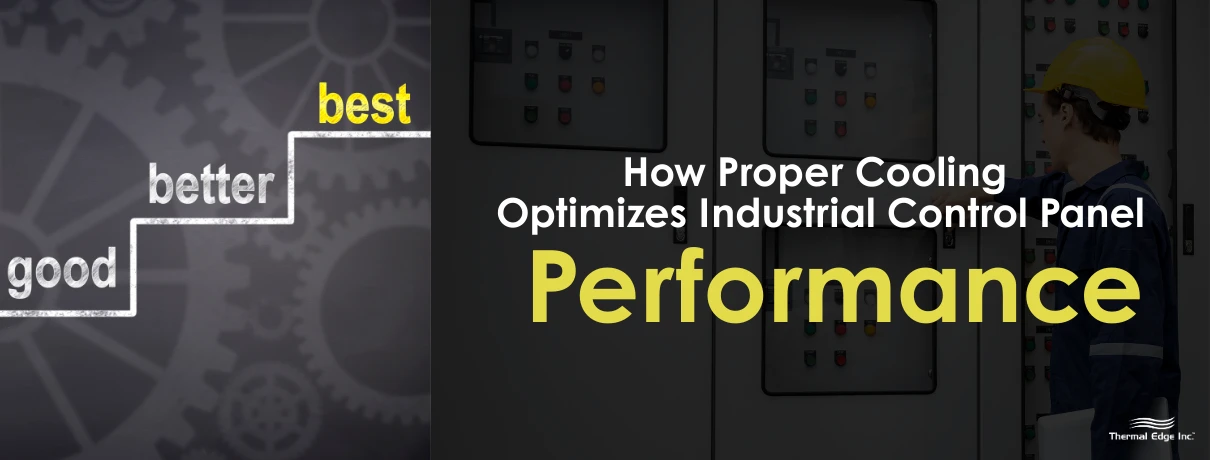How Proper Cooling Optimizes Industrial Control Panel Performance

Industrial control panels are extensively used for the control of complex machines. Due to diverse requirements that include the distribution of power to the machine and the measurement and control of various inputs and outputs, a wide variety of electrical equipment is used.
Panels are usually placed close to the machines they control and are subject to the same environmental conditions. Depending on the function of the machine and where it’s installed, these conditions may include extreme heat, the presence of water and chemicals, and high dust levels.
Factors that Affect Industrial Control Panel Performance
Enclosure Temperature
An industrial control panel’s internal temperature needs to be kept below the lowest maximum operating temperature limit of the equipment installed in the cabinet. The actual temperature of the enclosure is determined by the internal heat load, ambient temperature, effect of external heat sources such as solar radiation, and the method of cooling adopted. Several cooling solutions may be considered, including filtered fans, air to air heat exchangers and enclosure air conditioning. It’s good practice to choose a solution that minimizes internal temperature levels that could upset sensitive equipment.
Dirt, Dust and Chemicals
It’s essential that dirt and chemical vapors are kept out of industrial control panels. Reasons for this include the need to prevent dirt from affecting the proper operation of moving equipment, such as circuit breakers, relays and solenoids. Also, dirt may prevent low voltage contacts from closing and could lead to arcing on circuits. Corrosion caused by chemical vapors has a similar effect, and chemical deposits on circuit boards and electronic components used in industrial electronic equipment could lead to shorts and damaged boards.
If excessive dirt and dust is present, a NEMA 4 sealed enclosure is recommended, and in the presence of chemical vapors a fully sealed NEMA 4X enclosure should be used.
Humidity
Condensation is possible in any location that is subject to wide temperature swings, especially if the lowest temperature reached is close to or below the dew point. This is likely in outdoor locations and, in humid locations, condensation may even occur on cool surfaces when the dew point is unusually high.
In such situations, an enclosure air conditioner is an ideal way to dehumidify the air because of its natural ability to remove moisture. Additionally, an enclosure heater will ensure that the minimum temperature inside an outdoor enclosure stays above the dew point.
Internal Airflow Distribution
Careful consideration needs to be given to ensuring that the flow of cool air through the industrial control panel spreads throughout the cabinet and that equipment with high cooling demands, such as variable speed drives, receives sufficient cool air.
Natural passages should be provided to aid airflow and care taken to ensure that wiring harnesses and other equipment don’t interrupt airflow. Equipment with high cooling demand should be placed towards the bottom of the enclosure and close to the cool air inlet.
Benefits of Proper Cooling
Here are a few of the ways that proper cooling benefits industrial control panels:
HMI Displays
These operate better when cool, and even if designed for high ambient temperatures, there’s less chance of the display malfunctioning. Besides this, readability is improved and the risk of blacked-out screens due to overheating avoided.
AC drives
The heat generated by VFDs is directly related to the efficiency of the device and its load. VFDs need plenty of cool air because excessively high operating temperatures shorten the life of the drive and may lead to inaccurate speed control.
Backup Batteries
Virtually all batteries last longer when they are kept at moderate temperatures. Batteries may be used for standby power or to power a UPS. Apart from this, devices such as PLCs have small batteries that are used to maintain the memory when the devices are powered down.
Circuit breakers and fuses
Circuit breakers rely on thermal elements for tripping under overload conditions, and cooler operation reduces the possibility of inadvertent tripping. Similarly, fuses will blow below their rated current if allowed to get too hot.
PLCs
PLCs and other microprocessor-operated devices are more stable at lower temperatures and the chance of intermittent failure is sharply reduced.
Choosing the Right Cooling Solution
The adoption of an optimum industrial control panel cooling solution means there is less risk of outage due to inadequate cooling. Key elements to consider include a cooling solution that’s able to maintain the correct cabinet temperature under all ambient conditions, the need for enclosure sealing against dust, dirt and chemicals, and the requirement to control humidity and to ensure an optimum airflow throughout the enclosure.
To discover how to optimize industrial control cabinet performance through proper cooling, contact us at Thermal Edge and speak to one of our cooling experts.
